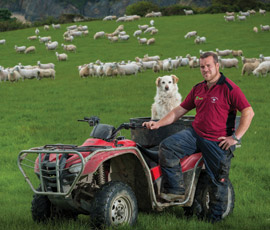2012 Sheep Farmer of the Year: Neil Perkins

If there is one farmer that is safeguarding his future and subsequent generations in farming then it’s Pembrokeshire sheep farmer Neil Perkins.
Everything about Dinas Island Farm is geared towards sustainability and streamlining costs. In 2006, Neil set himself a six-year strategy to create an ultimate low-cost system. Today, he has nearly achieved his goal.
But dramatic changes made to turn the National Trust tenanted farm into a profitable system haven’t been made on a whim. Neil has gained a vast amount of knowledge by immersing himself in the industry – acting as an HCC demonstration farm, sitting on several committees, as well as undertaking a Nuffield Scholarship.
As his first step in streamlining the 242ha farm, Neil decided to get rid of the beef and cereal enterprise and focus solely on sheep. This gave him the chance to start improving the grassland by re-seeding with clover-rich leys and correcting P+K levels.
Farm Facts: Dinas Island Farm, Pembrokeshire
- £79,000 margin before single farm payment
- Lambs finished off grass
- Contract-rears dairy heifers bringing in £15,000 a year clear profit
- Sells lambs through a co-operative
He also switched to pure Lleyns, purchasing 300 top-quality Lleyns initially with the aim of converting the whole flock of 1,800 ewes to the breed. Lleyns were chosen to maximise kilos of lamb production for every acre of grass.
Neil has also embraced EID, with all pure Lleyn lambs EID tagged at birth and performance recorded, allowing him to create an elite nucleus flock.
And Neil’s attention to detail, selecting the best lambs to breed from and using technology to help with his decision-making, as well as making the most from grass, means that in 2007 the gross margin per lamb was £32.27 giving an enterprise margin of £78,700 before single farm payment.
And Neil has already demonstrated he can survive without subsidy, investing two years’ worth of subsidy money into a brand new shed.
Winning Ways
- Surviving without single farm payment
- Getting involved in the industry
- Keen to educate consumers
- Securing the farm’s future
Neil says: “My whole ethos is to be in the top third of producers and to survive without subsidy. Hopefully this way, if I am efficient, I can ride the wave should market prices drop significantly or if the SFP goes.”
And an example of how Neil is always one step ahead has been with some of his breeding policies. He has been breeding for the myomax gene with the aim of increasing the yield of meat to bone and producing a better, more marketable carcass. The gene is now estimated to be in 70% of the flock.
“Neil demonstrates good grassland management and the benefit of identifying alternative uses for his time and resources. He is keen to develop his sheep breeding programme further with increased use of EBVs, and has made a good start at understanding his costs”
Dr Liz Genever Beef and sheep scientist, EBLEX
Flock health is paramount, with faecal egg monitoring allowing targeted worming, and lameness kept to a minimum.
But aside from the technical side of the farm, Neil and his wife Lynda are all for educating consumers by hosting regular school and farmer visits, helping other farmers and working for the environment.
He has been an HCC demonstration farm, is current chairman of NFU County Livestock and sits on the NSA’s Cymru policy committee.
“I have a philosophy not to moan about what is going on in the industry. If there’s a problem then let’s work together to resolve it.”
Sponsor’s View
“Sheer hard work, alongside outstanding innovation to produce a sustainable sheep business, are the hallmarks of all three finalists.”
Louise WelshAgriculture manager
Finalists
 Charley and Andrea Walker
Charley and Andrea Walker
Barnside Farm, Duns, Scotland
Charley and Andrea are willing to try new things and run a system that allows a good work-life balance. They have produced a low-input system on their 253ha upland sheep and beef farm that returns a good margin.
 Duncan Nelless
Duncan Nelless
Thistleyhaugh Farm, Morpeth, Northumberland
Duncan has transformed a fatstock show cattle enterprise into a thriving, 150-ewe organic farm. He is embracing EID, surviving without single farm payment, and spreading the risk with additional livestock enterprises.
Keep up with all the news from the 2012 Farmers Weekly Awards
